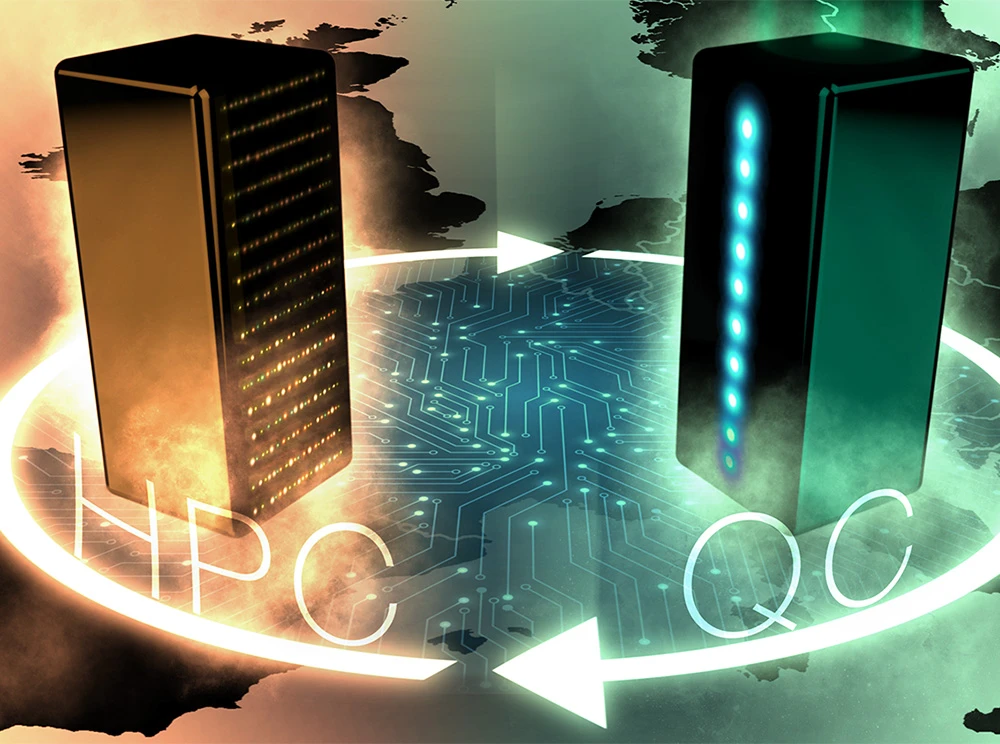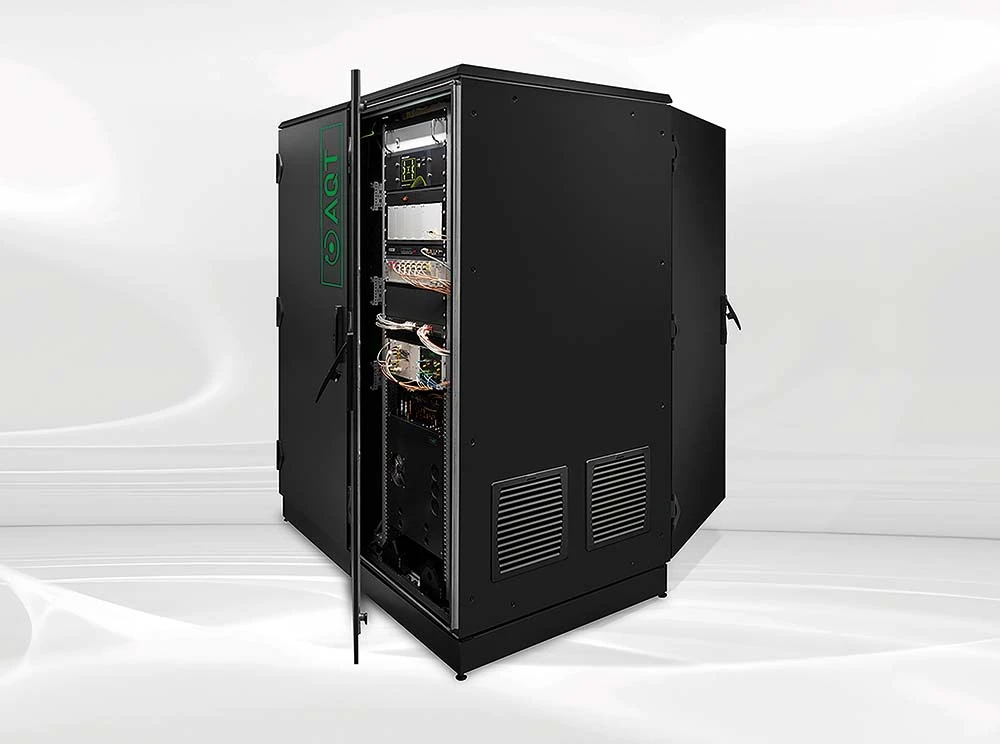Quantum computers integrated into high-performance-computing environment
The Austrian joint effort between the University of Innsbruck and AQT has successfully demonstrated the integration of a quantum computer (QC) into a high-performance-computing (HPC) environment. This hybrid infrastructure can now be used to tackle challenges in various fields such as chemistry, material sciences, or optimization.

© Photocredits: AQT/Helene Hainzer
Quantum computers promise to solve certain problems significantly faster than classical computers. However, they cannot solve all problems faster or more accurately than classical computers. Thus, the optimal solution to an arbitrary problem can be offered by a hybrid execution model consisting of a quantum computer and a classical high-performance computer infrastructure. Researchers and developers at the University of Innsbruck and AQT have realized such a hybrid infrastructure that offers easy access to quantum computational resources from within an established HPC cluster.
We present the realisation of a hybrid HPC-QC infrastructure that serves as testbed for the development of novel algorithms and solutions to tackle current limitations of classical computers.
The demand for computational power is constantly growing, together with an increasing consumption of resources to support these calculations. Here, the clock speed of processors within classical computers seems to have reached its limit with a typical clock frequency of a few GHz. Performance improvements in the last decade have mainly focused on parallelising tasks using multi-core systems, resulting in high-speed connected multi-node computing clusters operated within HPC centres. However, the computational performance only increases roughly linearly with more nodes. Rather than focusing on a homogenous setups of identical nodes, the development has shifted towards the operation of heterogenous infrastructures consisting of different specialised nodes or accelerators, like GPUs or NPUs – each highly optimised for a specific computation. With the rise of quantum computers and their promise to solve specific problems in chemistry or material sciences notably faster than classically possible, the necessity to investigate the integration of a quantum computer into HPC as a quantum accelerator was born.
Researchers and developers at the University of Innsbruck (UIBK) and at AQT started to investigate the integration of a quantum computer into an HPC environment in the context of the FFG-funded project HPQC (project nr. 897481). Building on top of standardised interfaces for quantum computers, the team in Innsbruck successfully interfaced the UIBK-operated computing cluster “LEO5” with the “IBEX Q1” quantum computer at AQT. The respective work represents the integration of a European quantum computer into an HPC facility and sets the stage for future research and development on quantum-enabled solutions within heterogeneous infrastructures.
The infrastructure is currently operated and extended in the context of the HPQC project, focusing on the demonstration of hybrid quantum solutions. Consortium partners such as Math.Tec GmbH in Vienna, or the research group around Prof. Ivona Brandić at the TU Vienna, can directly access and execute computations in this hybrid HPC-QC framework. The consortium builds on top of standardised resource and user management which facilitates the possibilities for notably more users benefiting from the infrastructure in Innsbruck. Besides research and development, the offered solutions shall also find applications in new lectures by the department of computer science, physics or chemistry to train an upcoming generation of quantum-aware researchers and engineers.
“Within the HPQC project, we readily have access to the Innsbruck HPC infrastructure. Our employees can implement calculations within the hybrid infrastructure and investigate novel solutions for logistics problems. Dr. Angelika Widl, one of our researchers, routinely pursues unexplored approaches thanks to the unprecedented possibilities in Innsbruck.” explains Dr. Karl Knall, CEO at Math.Tec GmbH, partner within the HPQC project.
“Quantum computers follow novel computational paradigms and thus offer new solutions – some of them outperforming the best classical algorithms. The integration of these accelerators into classical compute infrastructure, and finding hybrid solutions that combine the best of both worlds, is, however, an unexplored research domain. The HPQC project offers us the possibility to spearhead research and development in this academically and economically interesting field”, says Prof. Dr. Ivona Brandić, group lead for High Performance Computing Systems at the Technical University of Vienna.
Classical HPC clusters are typically installed in standardised 19-inch racks,as shown in Figure 1. While these devices provide astonishing computational power, certain problems in nature, in particular those that need to be described by quantum mechanics, scale unfavourably to the point of being only approximatively solvable – or not at all. The respective problems include the understanding of room-temperature superconductivity, which – once achieved – is expected to revolutionise all fields using electronics; other applications include chemical processes such as nitrogen fixation to develop cost and energy efficient fertilizers or realize carbon binding to address climate change. While there is a growing number of proof-of-concept quantum computers in experimental stage, AQT has developed the first 19-inch rack-compatible quantum computer, as depicted in Figure 2. Integrating quantum computers into HPC infrastructure offers researchers and developers the best of both worlds: access to classically outstanding computational capabilities paired with acceleration for specific problem classes. The challenge is to balance the workload between these two entirely different computational approaches – which part of a computational problem is best addressed on a classical computer, and at which point should the calculation be transferred to the quantum processor? Interfaces between the classical and quantum infrastructure, openly documented as outlined in Figure 3, enable researchers to creatively find, adapt, and extend the interplay between classical and quantum hardware. This open hybrid infrastructure in Austria will support new paradigms in computational methods to reduce the time-to-solution for classically intractable challenges.
For more details on the computational capabilities of the employed quantum computer we refer the reader to this summary , while details on the research activities on scientific computing at UIBK can be found here. The interface between the classical and quantum compute infrastructure is openly documented.

© Photocredits: Universität Innsbruck/Eva Fessler
Figure 1: HPC cluster “LEO5” at University of Innsbruck
The HPC cluster “LEO5” at the University of Innsbruck offers up to 250 billion operations per second. User access, resource management, and process flow follow international standards and are thus compatible with other HPC facilities.
Figure 2: Data-centre deployable quantum computer
AQT has realized the first quantum computer compatible with standardized 19-inch rack infrastructure. These systems can be readily installed at HPC or data centres. Operating at room temperature with a power consumption of less than 2 kW, this eco-friendly quantum computer offers the highest quantum volume within Europe.

© Photocredits: AQT/Dieter Kühl

© Photocredits: AQT/Dieter Kühl
Figure 3: Openly-documented HPC-QC interfaces
This integration of a quantum computer into an HPC facility will rely on a future, community-driven adaptation to address the growing understanding on how to best benefit from quantum computers. The respective interfaces are therefore openly documented to facilitate innovation in this rapidly evolving field of next-generation compute capabilities.
